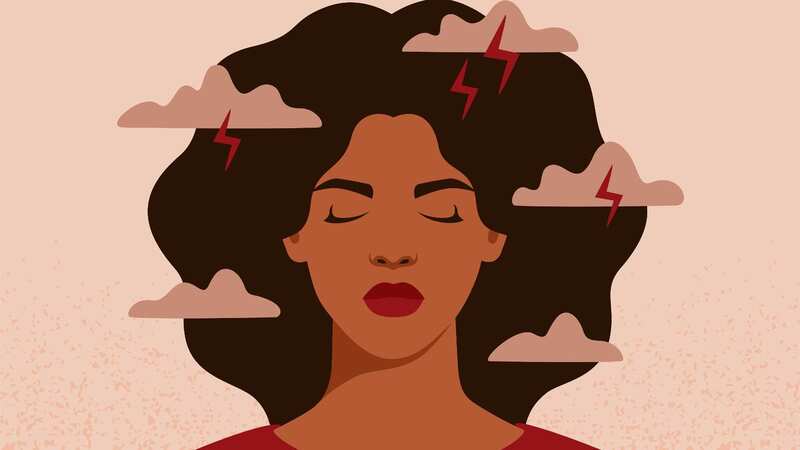Brain fog or dementia - doctor explains difference and symptoms to watch out for

Fiona Phillips ’ Alzheimer’s diagnosis in her early sixties has opened up the conversation on how early we should see our GP about symptoms we may suspect are early signs of the disease.
Questions are now being asked about the similarities between the symptoms of dementia and those often experienced by women going through the menopause.
Fiona’s husband Martin Frizell explained that the family first thought her symptoms were due to “the change” because she was suffering “brain fog, anxiety and confusion”, but treatment with hormone replacement therapy (HRT) didn’t help.
Here, GP Dr Hana Patel explains the differences between the two conditions...
 Dr Hana Patel is a GP specialist in women’s health (0939753487)
Dr Hana Patel is a GP specialist in women’s health (0939753487) Fiona Phillips and her husband Martin Frizell (Getty Images Europe)
Fiona Phillips and her husband Martin Frizell (Getty Images Europe)In your experience, how often do women misinterpret Alzheimer’s for menopause-related symptoms?
 Baby boy has spent his life in hospital as doctors are 'scared' to discharge him
Baby boy has spent his life in hospital as doctors are 'scared' to discharge him
It’s not common, but it can happen. As GPs, we start with taking a history and asking patients more about their symptoms. So, while there are similarities between symptoms in Alzheimer’s
and the menopause and
they can overlap, we would always try to exclude Alzheimer’s early on.
How are menopause symptoms and Alzheimer’s similar in the way they present themselves?
Because many symptoms of perimenopause and menopause also occur in dementia, some women worry they are showing signs of young onset dementia when they’re going through it, particularly if they have a family history of the disease. For example, “brain fog” is a very common symptom of menopause. Many women say that it makes their brain feel like cotton wool. However, some researchers say that the “cloudy” thinking you get with brain fog is very different from cognitive problems associated with dementia
or Alzheimer’s. The key difference is that diseases like dementia and Alzheimer’s affect more than memory. They change your ability to function in your daily life.
Are there other symptoms of Alzheimer’s that are similar to menopausal symptoms?
Oestrogen decrease during perimenopause and menopause can lead to flushing, mood changes, anxiety and, in some studies, mild cognitive changes such as mild memory loss, verbal fluency impairment and slowed psychomotor speed [the time it takes to process information]. This menopause-related cognitive decline is very mild, but could be confused with Alzheimer’s.
When is the right time for menopausal women to check whether their brain fog could be something more serious?
If it is becoming an issue for somebody personally and/or professionally, affecting daily life, relationships or work. Or if, to them, it simply seems more than what to expect with just menopausal symptoms. Trust your gut and absolutely always speak to your GP with any worries or concerns you have.
Is mistaking Alzheimer’s for brain fog possibly a reason why so many women remain undiagnosed?
Yes, it could be. Another common misconception I’ve experienced as a GP is that someone is exhibiting symptoms of depression, when in fact they’re exhibiting signs of dementia and are only diagnosed later on.
 Fiona Phillips pictured at home in London with Mirror editor Alison Phillips (Daily Mirror)
Fiona Phillips pictured at home in London with Mirror editor Alison Phillips (Daily Mirror)What are the key signs and indicators that brain fog menopausal symptoms might be more serious?
 Disabled woman paralysed after falling from wheelchair on plane walkway dies
Disabled woman paralysed after falling from wheelchair on plane walkway dies
Different types of dementia can affect people differently, and everyone will experience symptoms in their own way. However, there are some common early symptoms that may appear some time before a diagnosis of something more serious. These symptoms are often mild and may get worse, but only very gradually. It’s often termed “mild cognitive impairment” (MCI) as the symptoms are not severe enough to be diagnosed as dementia yet. You might not notice these symptoms if you have them, and family and friends may not notice or take them seriously for some time. In some people, these symptoms will remain the same and not worsen. But some people with MCI will go on to develop dementia. It’s important to stress that Alzheimer’s is not a natural part of ageing. This is why
it’s important to talk to a GP sooner rather than later if you’re worried about memory problems or other symptoms.
How do GPs screen for Alzheimer’s?
There’s no single test for dementia. A diagnosis is based on a combination of cognitive assessments, which may be done by a GP or a specialist at a memory clinic or hospital. One form of test carried out in the earliest stages of assessment is a memory test. Brain scans are often used for diagnosing dementia once the simpler tests have ruled out other problems. Not everyone will need a brain scan, however, particularly if the tests and assessments show that dementia is a likely diagnosis. These scans may also be used to check for evidence of other possible problems that could explain a person’s symptoms, such as a stroke or a brain tumour.
Is there a self-test that can be done that indicates whether a woman is suffering with symptoms of the menopause or Alzheimer’s?
That is difficult as the menopause can’t be tested for. But many people benefit from seeing their doctor as soon as menstruation ends. I’d always advise women to see a GP to discuss what comes next and their options going forward. A doctor can often confirm whether any mental changes are likely perimenopause/menopause-related by asking some questions. They may also test hormone levels and perform other analyses of the blood and urine to rule out health issues. No tests, however, can conclusively indicate that menopause has begun. But by speaking to your doctor at the end of menstruation, it can mean they will have a better understanding of your individual menopause symptoms and will be better equipped to assess whether any changes down the line could be due to something more serious.
Dr Hana Patel is a GP specialist in women’s health and mindset coach - find more information here
Read more similar news:
Comments:
comments powered by Disqus

































